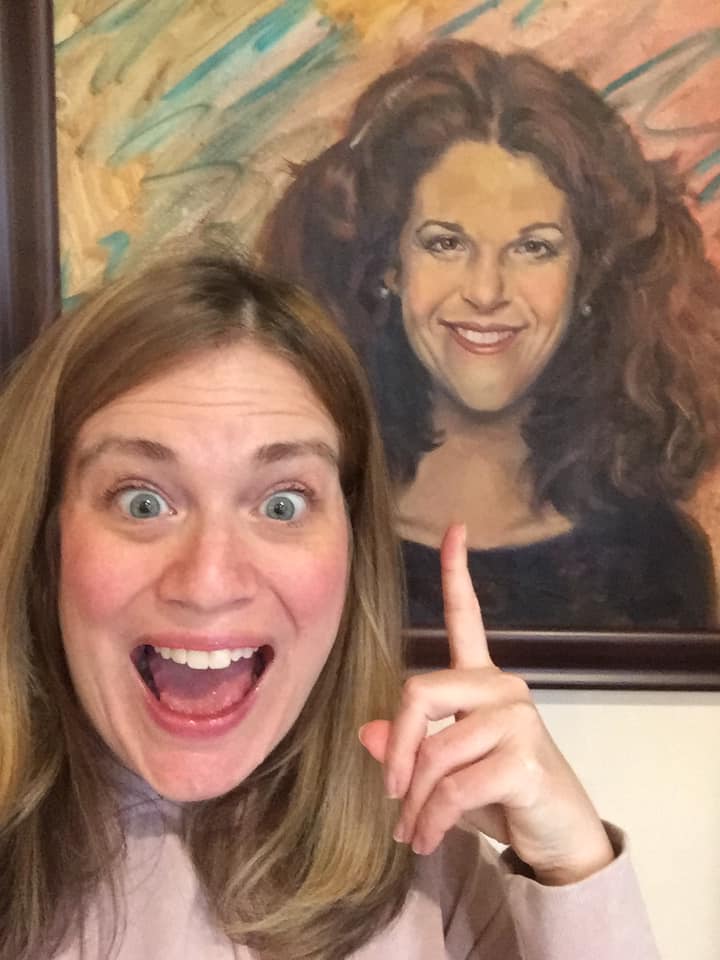March 17, 2020
Finding Support Throughout Your Journey

Written by Head for the Cure Ambassador and Anaplastic Astrocytoma Survivor Molly Marco
When I was first diagnosed, I was so overwhelmed by everything coming at me—I didn’t know where to turn or what to do. I was still taking everything in and wondering what came next.
Once that tornado settled down, I wanted to talk to other people in a similar situation. I wanted to know what to expect. I wanted reassurance, but I also wanted “real talk”; from the doctors and nurses, but more than anything I wanted to know the experiences of my fellow patients. I think we often need both; “What does this mean?” v. “What does this feel like?”
Early on, right at diagnosis, my neuro-oncologist and nurses (my brain A Team) made sure I had pamphlets and information about what organizations and groups are available to me. Yours should, too. If not, start bothering them to start doing that. Some hospitals have monthly group meetings for specific cancers, including brain cancer. If not, here are some organizations to look into: Gilda’s Club, National Brain Tumor Society, American Brain Tumor Association, Imerman Angels, and Twitter’s monthly #BTSM (Brain Tumor Social Media) chats.

Gilda’s Club
I live very close to a Metro Detroit Gilda’s Club, so that was one of my first stops. Because of my seizures, I couldn’t drive for 6 months (+2 more months when I had a seizure right before my craniotomy). I walked to the closest support place. Gilda’s Clubs are great. They are very cozy and have lots of activities such as yoga, art, cooking, and support for patients. You can be 25 years in remission or wearing your Optune device. It doesn’t matter. It’s a great way to interact not only with brain cancer patients, but people going through similar journeys with different cancers.
Gilda’s Clubs are in several cities including New York, Kansas City, Chicago, and Twin Cities.
National Brain Tumor Society (NBTS)
Aside from the outstanding annual Head to the Hill event in Washington D.C., NBTS also hosts monthly social media chats. Many of these people are active and social on other medias, so it’s comforting—you feel like you’re in a live chat with friends (because you are). If you’re new, you’re ushered right in and will have people with advice and information.
Learn more about NBTS here.
American Brain Tumor Association (ABTA)
I first knew about ABTA because I basically came home with a briefcase full of ABTA booklets. I didn’t have to ‘Dr. Google’ Anaplastic Astrocytoma because I had a booklet all about it thanks to this organization. I had also heard of ABTA because one of my buds in my hospital’s brain group talked about a conference in Chicago. I went when I was nearing the end of my chemo cycles and wanted to meet people and learn things. That was the meeting of one of my first Twitter #BTSM chat friends, Sabine. I learned a lot. I also participated in one of their BT5Ks the following year (even got to be on my local news talking about my brain cancer patient experience).
Learn more about ABTA here.
Imerman Angels (IA)
They are so cool. An organizations that links patients together, AND links caregivers with other caregivers. It’s one of the first things I did because I was stuck at home: I couldn’t drive, I was exhausted, and still healing. I wanted to know what someone else went through who had my same diagnosis (Anaplastic Astrocytoma) and was similar to me (female and mid-30s). I was almost immediately linked with someone (a “mentor”). I wasn’t a fan of phone calls (you can even say what kind of interaction you want: phone, email, both), so she emailed me right away and answered my questions about what to expect from radiation and my Temodar. A year or so in, I felt more impulse to help newly diagnosed or people in more rural areas with less access to fellow cancer comrades. I moved away from being a mentee, and onto being an IA mentor. I love it. Being able to help someone else, gives me courage and strength.
Learn more about Imerman Angels here.
#BTSM (Brain Tumor Social Media) chats on Twitter: First Sunday of every month at 9:00 PM EST
You don’t have to have a Twitter account to observe, but I highly recommend having one to fully participate in the chats and to take advantage of the company, the knowledge, the feedback, and perspectives. Start by following @BTSMchat account on Twitter. Here’s a guide on how to participate in these chats. You can make friends really quickly. Sometimes it helps just to follow some of the long-time followers on the account, pretty soon you’ll get the hang of things. Because of the amazing folks here, I learned about events (such as Head to the Hill), and when I go to these events, no matter where I am (D.C., Chicago, Detroit, Los Angeles, or San Francisco)—I feel like I have friends. I have name/memory issues, so it’s kind of crazy. I know people more by their Twitter handle (by repeatedly using them, I think it’s a long-term memory!) than by their actual name.
You may feel alone when you are newly diagnosed or experiencing a new growth or worried about someone you love. I want to reassure you in at least this one small way: You are NOT alone. And pretty soon, you can be the person helping other people navigate their journey. And when you’re helping, suddenly the anxiety you were feeling starts to diminish. THAT gives me PURPOSE.
Learn more about Molly’s story by following her on Twitter, Instagram, or Facebook!